Desai Sethi Researchers Earn Top American Society of Men’s Health Abstract Honors
DSUI looks to create a comprehensive health report for Florida men based on the research presented at the 2023 annual meeting.
Two up-and-coming researchers at the Desai Sethi Urology Institute (DSUI) at the University of Miami Miller School of Medicine won the top two of three recognized abstracts at the American Society for Men’s Health 2023 Annual Meeting, October 13 and 14 in Austin, Texas.

Bruce R. Kava, M.D., professor of urology and director of men’s health at DSUI, had several roles at the meeting, which attracts a spectrum of medical disciplines in men’s health, from urology, cardiology, endocrinology and oncology to gerontology, psychiatry, psychology, and sexual and reproductive medicine.
“The research we shared at the American Society for Men’s Health meeting is further evidence that DSUI is becoming a center of excellence in men’s health,” Dr. Kava said, also president-elect of the American Society for Men’s Health.
Florida Men’s Health Research Takes Top Honors
Miller School urology resident Ashley Gordon, M.D., discussed suicide trends in Florida as they relate to the development of a men’s health initiative. Pre-med student Elena Ruiz, who works with Dr. Kava, presented on identifying potentially reversible sources of morbidity and mortality in Floridian males.
Both abstracts won top honors at the meeting.

“The overarching goal of this research is to develop a men’s health report for Florida,” said Dr. Kava, who is the principal investigator on both studies. “We reached out to government agencies to obtain data looking at a variety of different men’s health issues and plan to use this report card to help inform Florida’s health education and public policy.”
Among the findings in Ruiz’s presentation:
- The life expectancy for males in the state of Florida is five years less than females, with women living an average of 82.6 years, versus men at 77.1 years. The disparity is worse among people of Hispanic origin and African Americans.
- The leading causes of death among Florida men are heart disease, followed by cancer, unintentional injuries, COVID-19, cerebral vascular disease, and a variety of other diseases.
“For men ages 18 to 54, unintentional injuries, homicide and suicide account for 75% of deaths,” Dr. Kava said. “Unintentional injuries include falls, suffocation, drownings and firearms, which are targets for mitigation efforts.”
Though suicide is not typically something that urologists deal with, it is an important focus of men’s health, according to Dr. Kava.
“Dr. Gordon found that two groups of Florida men are committing suicide at increased rates—younger men and older men over 60,” he said. “When you put the numbers together, the number of suicides among males in Florida is almost equal to the number of deaths from prostate cancer.”
The Miller School researchers also looked at rates of harmful but modifiable behaviors and found:
- About 10% of Florida males don’t wear seatbelts
- 16% smoke cigarettes
- 7% vape
- 24% are sedentary
- 31% are obese
“We also found that about 30% of males who are of age to get PSA screenings have not done so,” he said.
Part of the Men’s Health Discussion
Dr. Kava’s presentation on regenerative strategies for erectile dysfunction focused on research conducted by Ranjith Ramasamy, M.D., director of reproductive urology at DSUI, along with co-investigator Thomas Masterson, M.D., assistant professor of clinical urology at DSUI.

“Dr. Ramasamy has done a tremendous amount of work in the area and has been awarded a significant grant from NIH for a first-of-its-kind study looking at treating erectile dysfunction using a combination of platelet-rich plasma and shockwave therapy,” Dr. Kava said.
Dr. Kava’s presentation on alternatives for patients who can’t tolerate testosterone therapy or don’t want to take it delved into strategies that are more likely to preserve fertility and testicle size and potentially avoid side effects that require phlebotomy, such as elevated red blood cell counts.
“With DSUI’s growing emphasis on the health care needs of men, it is important that we not only share informative and timely research but also take a leadership role in men’s health,” Dr. Kava said. “We are accomplishing those goals with the American Society for Men’s Health, an organization that aims to promote education, research and teaching related to the unique health care needs of males from adolescence to the end of life.”
Tags: Department of Urology, Desai Sethi Urology Institute, Dr. Bruce Kava, erectile dysfunction, men's health, suicide


